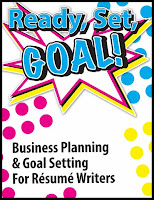 |
| Photo of me from 2001. |
Of course! I started out as a resume writer, and I still write resumes. Not as many as I did a few years ago when I was a subcontract resume writer, but yes, I still write resumes, cover letters, bios, and even LinkedIn profiles.
I was reading an article in the February 2014 issue of Inc. about "origin stories" and thought I should share mine here, so you can understand where Resume Writers' Digest and BeAResumeWriter.com came from.
You probably already knew that I wrote my first resume at age 12, but you might not know that Jon and I started our business right out of college in the spring of 1996. In fact, I remember calling to arrange an appointment to see an office space while sitting in the hallway at the University of Nebraska at Omaha (my alma mater) between classes our senior year.
We started our business with the goal of serving SOHO clients -- Small Office, Home Office businesses. Soon, we'd change that to helping individuals and small businesses market themselves -- people with resumes, and businesses with newsletters and other print pieces.
In high school, I had taken second place in the "Job Interview" category at the Future Business Leaders of America State Leadership Conference. Students were asked to write a resume and cover letter for a job at "Merit Corporation" and then interview with businesspeople who volunteered as judges at the conference. My "genius moment" was when I decided to specify what Merit Corporation was. Usually, students created a very generic resume and cover letter to this "mystery" employer. I decided it would be more effective to identify the type of business Merit was through my cover letter and resume so that the employer could have a more realistic interview. After all, he or she was supposed to be representing Merit -- and yet, most interviews were extremely generic, because neither the student nor the interviewer had anything specific to talk about. (Somewhere around here I have the floppy disk with the resume and cover letter I wrote.) In examining my scores from the judges, I learned that what kept me from winning the category was my attire -- my first lesson in the importance of dressing for success. (I wore a black-and-gold skirt and jacket -- the judges were expecting blue or black only).
Anyway, my Yellow Pages ad was a client magnet, and I was writing a couple of resumes a week. But I was young (21) and knew there was a lot I didn't know. In 1998, I wanted to pick the brain of some of the industry's leaders -- people like Wendy Enelow and Louise Kursmark -- but I didn't think if I just asked them directly that they would talk to me. (I have since learned that people in our industry are some of the most generous you'll find anywhere!) But at the time, I thought, "Well, I could interview them for a publication, and then they'll talk to me!" (I had a few magazine articles published in national publications while I was in college while I had majored in journalism/public relations.) So I decided to start a trade newsletter, Resume Writers' Digest, to get answers to the questions I had as a resume writer. In time, it grew to several hundred subscribers, paying $60/year for six print issues.
In 2004, I got distracted by other things in my life and business, and decided to stop publishing the newsletter. I brought it back as an occasional online publication starting in 2007, because I was still writing resumes … and I still had questions!
Then, in 2011, I decided to start a membership site for resume writers to share the content I was creating for my own clients. I figured other resume writers could use the information with their clients too — so I license the content to subscribers to use with their clients. Instead of starting from scratch, resume writers can take the Pass-Along Materials and use them "as is" or customize them. Most of the ideas for the Pass-Along Materials come from my work with my clients.
So yep, I'm still writing resumes.





















